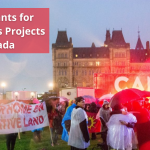Projects for the economic development of Indigenous communities may be funded entirely or in part with capital costs by the Aboriginal Business Investment Fund (ABIF). These kinds of initiatives help Indigenous Peoples, and their communities achieve better social and economic outcomes.
Projects must be close to beginning operations or breaking ground during the fiscal year following funding in order to qualify for funding.
The consequences that applicants must show will last throughout time are:
- boost the proportion of Indigenous-owned companies in the community
- increase the number of jobs available to Native Americans
- build or expand indigenous tribes’ native income sources
- bolstering the indigenous communities’ economies
Indigenous Relations make funding decisions based on the outcomes of a competitive review procedure. These components of a strong application include:
- a formal Resolution and other supporting documents that show the project has the community’s support
- the ability to produce a net economic benefit, such as employment and income for the community
- the shown balance between grant funds, commercial financing, management competence, and business skills on the project
- viability of the proposed business opportunity over the long term
- the project’s potential to result in spinoff business opportunities
Funding
A project for economic development owned by an Indigenous community may get funding from ABIF ranging from $150,000 to $500,000. That could represent up to 100% of eligible project costs. A grant from the ABIF may be combined with money from the government and businesses.
Suitable Candidates
Suitable ABIF applicants are Alberta-based Indigenous communities or corporations owned by Alberta-based Indigenous communities:
- The planned firm or joint venture must be owned and controlled by communities to the extent of at least 51%.
- Corporate bodies must be legitimate.
- Applicants must meet the terms and conditions of any prior financing for Indigenous Relations.
An Indigenous community may only submit one ABIF proposal in any given funding year.
Eligible Expenses
The ABIF program’s goal is to finance the capital components of business endeavours.
Capital expenses are incurred while purchasing, constructing, or upgrading substantial fixed assets like buildings, machinery, and other tangible assets. They need to be beneficial for more than one fiscal year.
Unallowable Expenses
The expenses listed below are ineligible for ABIF funding:
- Various sources occasionally obtained passive business income streams from these ventures, frequently without their material or active involvement (for example, projects that generate income from rent, royalties, dividends and capital gains)
- Goodwill payments for services that are typically given gratis, such as honoraria for volunteer work in the community and maintenance and repair charges
- Infrastructure expenses covered by other government funding sources or eligible for payment from them (for example, roads, rails and utility services)
- services for economic growth and training
- costs associated with projects that have previously been approved but which are unrelated to economic development
How to Apply?
Step 1: Review the instructions
For information on the rules and regulations of the programme, consult the ABIF Application Guidelines.
Step 2: Finish assembling your application.
The application materials must contain:
- Grant Application Form for ABIF (PDF, 120 KB) – Please carefully review the application and complete it by explicitly outlining the business and scope of work, including a breakdown of each of the following:
- budgetary projections or financing sources
- a realistic schedule for completing project activities and milestones
- a comprehensive business plan for continuing operations
- project schedule if construction is necessary
- The main component of the application is the thorough business plan. Details on the required content can be found in the ABIF Application Guidelines.
- Community support – All candidates must show that their proposal has organizational support.
- Documentation that supports a claim; evidence of partnerships.
Step 3. Submit your application materials.
Before intake closes, applicants must send one electronic copy of the whole application packet to [email protected]
Evaluation Process
Projects that successfully navigate a competitive evaluation process based on these criteria—community benefits, management risk, industry risk, and the financial risk for each application—will be awarded grants.
Evaluation occurs in two stages:
- Each application will be evaluated separately by a cross-ministry panel of up to three people.
- The top-scoring proposals that satisfy all the criteria and have the potential for financial viability will be advanced to a more thorough evaluation by the panel.
Each applicant will be informed of the funding decision by staff. Applicants may request a debriefing session to review the results of the comprehensive evaluation process.
Reporting
A brief narrative synopsis and audited financial statements are required of successful candidates. The summary may also contain the following information:
- Project relevance of the pertinent capacity data in-depth results, difficulties, and triumphs, as well as lessons learned
The Alberta government reserves the right to follow up with the applicants to assess the project’s efficacy, including talks on best practices and advancement.
Deadline:
Applications for the ABIF for 2022–2023 are now being accepted. The deadline for applications is September 30, 2022.







Leave a Reply